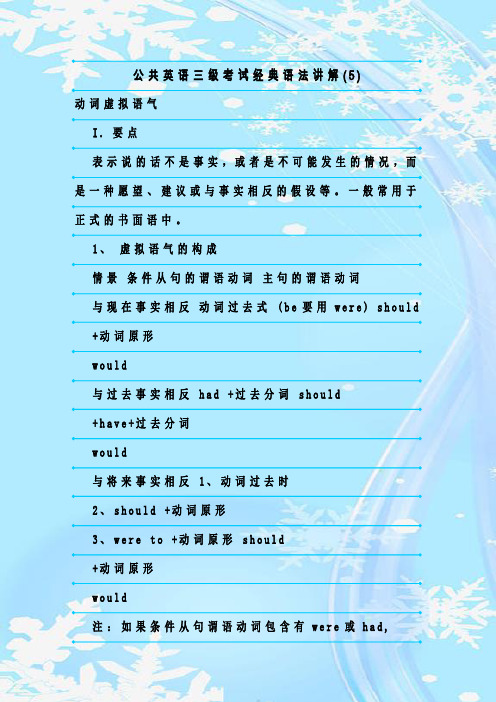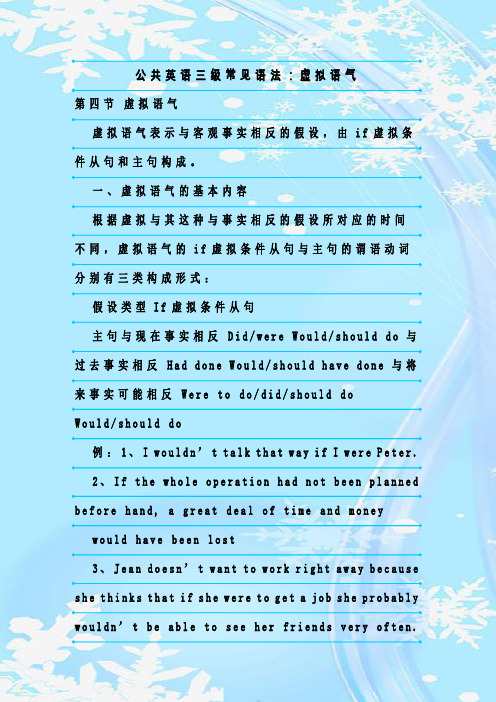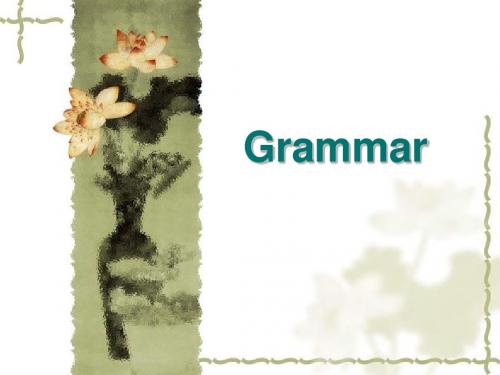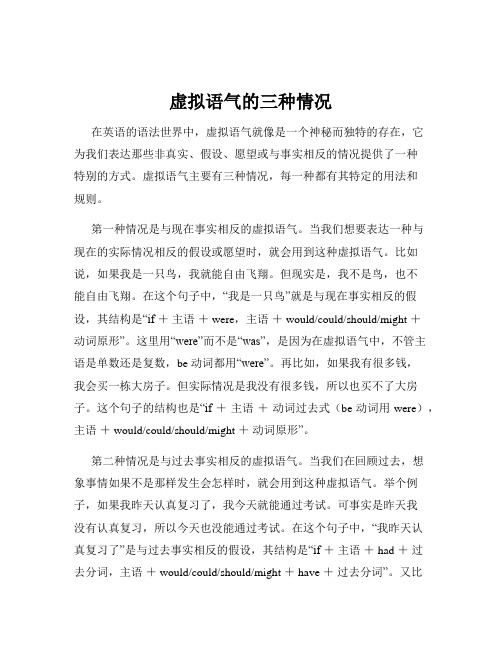2020年公共英语三级常见语法:虚拟语气
PETS3 语法笔记

PETS3 语法笔记PETS 语法辅导:虚拟语气16. 虚拟语气1) 概念虚拟语气用来表示说话人的主观愿望或假想,所说的是一个条件,不一定是事实,或与事实相反。
2) 在条件句中的应用条件句可分为两类,一类为真实条件句,一类为非真实条件句。
非真实条件句表示的是假设的或实际可能性不大的情况,故采用虚拟语气。
16.1 真实条件句真实条件句用于陈述语气,假设的情况可能发生,其中 if 是如果的意思。
时态关系句型: 条件从句主句一般现在时 shall/will + 动词原形If he comes, he will bring his violin.典型例题The volleyball match will be put off if it ___.A. will rainB. rainsC. rainedD. is rained答案B。
真实条件句主句为将来时,从句用一般现在时。
注意:1) 在真实条件句中,主句不能用be going to表示将来,该用shall, will.(错) If you leave now, you are never going to regret it.(对) If you leave now, you will never regret it.2) 表示真理时,主句谓语动词便不用shall (will) +动词原形,而直接用一般现在时的动词形式。
16.2 非真实条件句1)时态:可以表示过去,现在和将来的情况。
它的基本特点是时态退后。
a. 同现在事实相反的假设。
句型 : 条件从句主句一般过去时 should( would) +动词原形If they were here, they would help you.b. 表示于过去事实相反的假设。
句型: 条件从句主句过去完成时 should(would) have+ 过去分词If she had worked harder, she would have succeeded.The rice would not have been burnt if you had been more careful.If my lawyer had been here last Saturday, he would have prevented me from going.If he had come yesterday, I should / would have told him about it.含义:He did not come yesterday, so I did not tell him about it.If he had not been ill and missed many classes, he would have made greater progress.含义: He was ill and missed many lessons, so he did not make greater progress.c. 表示对将来的假想句型: 条件从句主句一般过去时 should+ 动词原形were+ 不定式 would + 动词原形should+ 动词原形If you succeeded, everything would be all right.If you should succeed, everything would be all right.If you were to succeed, everything would be all right.16.3 混合条件句主句与从句的动作发生在不同的时间,这时主,从句谓语动词的虚拟语气形式因时间不同而不同,这叫做混合条件句。
2023年大学英语三级语法知识总结汇总

三级语法考点归纳一.虚拟语气1.i.句中虚拟形式if 引导的非真实条件句(纯粹假设或发生的也许性不大):条件从句主句与现在相反did (be were) would/ should/ might/ could do与将来相反did (be were) would/ should/ might/ could do与过去相反had done would/ should/ might/ could have done例句If we left (leave) now, we should arrive in time.If they hadn’t gone on vacation, their house wouldn’t have been broken (break) into.2.原形虚拟:a.表命令、决定、规定、建议等词语之后的that-分句中,用动词原形。
suggest, demand, advise, propose, order, arrange, insist, command, require, request, desire …… that +(should) do例如He suggested that we should leave early.My suggestion is that we should tell him.b.I.i.(was.形容词/名词tha.….(should.do/例如It is absolutely essential that all the facts be examined first.3.一些句型中的虚拟形式:1.It’.(high.about.th.first.etc..tim.(that.…动词过去时.例.It’.tim.w.left..例.I.i.tim.w.wen.t.bed.2 would rather/sooner 宁愿as if/ though 仿佛would rather/sooner 谓语用过去时与现在或者将来相反as if/ though 谓语用过去完毕时与过去相反4.练习1..______.tr.i.agai.i.I_______you.A.will.a......B.should.a....C.would.wer...D.would.ha.been2.I.i.______.no.fo.th.water.th.plant._______live.A.were.woul.no..B.is.coul.no...C.were.coul...D.did.coul.not3.I.. ______.tha.chanc.t.sho.m.ability.._______th.presiden.o.thi.school.A.hav.no.had.coul.no.become ..B.ha.no.had.woul.no.hav.becom.C.di.no.have.coul.no.become ..D.doesn’.have.wil.no.become4.H.______.b.tha.burgla.i.yo.______.t.sav.him.A.migh.hav.bee.killed.hadn’.com...B.wil.b.killed.didn’.comeC.ma.b.killed.did’.com.......D.coul.b.killed.haven’.come5.I.i._______fo.you.help.._______tha.har.tim.wit.s.littl.money.A.wer.not.woul.no.spen........B.i.not.ca.no.spendC.ha.no.been.woul.no.hav.spen....D.hav.no.been.wil.no.spend6.Wher.______.yo.g.i.wa._______?A.will.break.ou............B.do.wil.brea.outC.would.wer.t.brea.ou........D.will.i.t.brea.out7.Sh.wishe.sh.______.tha.humiliatin.thing.A.doesn’.d....B.didn’.d.....C.haven’.don..D.hadn’.done8.Th.chairma.suggeste.tha.th.meetin.______.pu.off.A.ca.b.....B.b......C.i.......D.wil.be9.I.i.vita.tha.h.______.immediately.A.shoul.g...B.mus.g....C.goe......D.wen.10.I.i.tim.w._______d.ou.homework.A.begi.t....B.ca.begi.t..C.bega.t....D.wil.begi.to答案:1.选C。
最新整理公共英语三级考试经典语法讲解(5)

公共英语三级考试经典语法讲解(5)动词虚拟语气I.要点表示说的话不是事实,或者是不可能发生的情况,而是一种愿望、建议或与事实相反的假设等。
一般常用于正式的书面语中。
1、虚拟语气的构成情景条件从句的谓语动词主句的谓语动词与现在事实相反动词过去式 (b e要用w e r e) s h o u l d +动词原形w o u l d与过去事实相反 h a d+过去分词 s h o u l d+h a v e+过去分词w o u l d与将来事实相反 1、动词过去时2、s h o u l d+动词原形3、w e r e t o+动词原形 s h o u l d+动词原形w o u l d注:如果条件从句谓语动词包含有w e r e或h a d,s h o u l d,c o u l d有时可将i f省去,但要倒装。
如:H a d y o u(I f y o u h a d)i n v i t e d u s,w e w o u l d h a v ec o m e t o y o u r p a r t y.2、虚拟语气在各种从句的应用(1)在主语从句中用来表示惊奇、惋惜、理应如此等,其谓语形式是”s h o u l d(可省)+动词原形”,常用于以下三种句型中。
句型一:I t i s n e c e s s a r y(i m p o r t a n t,n a t u r a l,s t r a n g e,e t c)t h a t…句型二:I t i s a p i t y(a s h a m e,n o w o n d e r,e t c) t h a t…句型三:I t i s s u g g e s t e d(r e q u e s t e d,p r o p o s e d, d e s i r e d,e t c)t h a t…如: I t i s s t r a n g e t h a t h e(s h o u l d)h a v e d o n e t h a t.I t i s a p i t y t h a t h e(s h o u l d)b e s o c a r e l e s s.I t i s r e q u e s t e d t h a t w e (s h o u l d) b e s o c a r e l e s s.(2)在宾语从句中用于s u g g e s t,p r o p o s e,m o v e,i n s i s t,d e s i r e,d e m a n d,r e q u e s t,o r d e r,c o m m a n d 等动词后的宾语从句中,表间接的命令和建议。
最新整理公共英语三级常见语法:虚拟语气

公共英语三级常见语法:虚拟语气第四节虚拟语气虚拟语气表示与客观事实相反的假设,由i f虚拟条件从句和主句构成。
一、虚拟语气的基本内容根据虚拟与其这种与事实相反的假设所对应的时间不同,虚拟语气的i f虚拟条件从句与主句的谓语动词分别有三类构成形式:假设类型I f虚拟条件从句主句与现在事实相反 D i d/w e r e W o u l d/s h o u l d d o与过去事实相反 H a d d o n e W o u l d/s h o u l d h a v e d o n e与将来事实可能相反 W e r e t o d o/d i d/s h o u l d d oW o u l d/s h o u l d d o例:1、I w o u l d n’t t a l k t h a t w a y i f I w e r e P e t e r.2、I f t h e w h o l e o p e r a t i o n h a d n o t b e e n p l a n n e db e f o r e h a n d,a g r e a t d e a l o f t i m e a n d m o n e yw o u l d h a v e b e e n l o s t3、J e a n d o e s n’t w a n t t o w o r k r i g h t a w a y b e c a u s e s h e t h i n k s t h a t i f s h e w e r e t o g e t a j o b s h e p r o b a b l y w o u l d n’t b e a b l e t o s e e h e r f r i e n d s v e r y o f t e n.4、I w o u l d a s k G e o r g e t o l e n d u s t h e m o n e y i f I k n e w h i m.5、D o y o u t h i n k t h e r e w o u l d b e l e s s c o n f l i c t (战斗、斗争) i n t h e w o r l d i f a l l p e o p l e s p o k e t h e s a m e l a n g u a g e.6、I f B o b h a d c o m e w i t h u s, h e w o u l d h a v e h a d ag o o d t i m e.二、i f的省略形式(又称虚拟语气的倒装结构)在i f虚拟条件从句中,如果谓语部分包含w e r e,s h o u l d,h a d等词,则可以把这些词放到主语前,省略i f,构成虚拟语气的倒装结构。
高考英语语法:常见虚拟语气讲义

虚拟语气虚拟语气英语中的语气有三种:陈述语气、祈使语气和虚拟语气 其中虚拟语气是指把动作当作一种只存在于讲话人想象中的“假设”或“推测”而不是当作客观事实。
它表达的是怀疑、忧虑、推测、假设、想象和祝愿等。
1、虚拟语气在非真实条件句中的应用2、虚拟语气在其他句式中的应用(1)在“It is desired / suggested / proposed / necessary / important / strange / natural / a pity+that...”句式中,从句中的谓语动词用“(should+)动词原形”结构。
如:It is important that we (should) protect the forest well.(2)表示命今或要求(demand, order, require, command, desire)、建议(suggest, advise, recommend)、坚持(insist)等动词后的从句中谓语动词用“(should+)动词原形”结构。
如:He commands that I (should) arrive at the airport within 30 minutes.My suggestion is that we (should) go to the hospital at once.[注意]当 suggest 表示“暗示,表明”,insist 表示“坚持说”时,它们后面所接的宾语从句用陈述语气。
如:His smile suggested that he did well in the test.(3)动词 wish 后的宾语从句中谓语动词有三种形式:① 当表示与现在事实相反时,谓语动词用动词的过去式(be 用 were); ② 当表示与过去事实相反时,谓语动词用“had+过去分词”或“would/could+have+过去分词”;③ 当表示与将来事实可能相反时,谓语动词用“would/could/should/might+动词原形”;如:wish I had worked harder when I was a student.条件从句谓语动词 主句谓语动词 与现在事实相反did / (be 动词用were) would+could+should+might+动词原形 与过去事实相反had done would+could+should+might+have done 与将来事实相反动词过去式 / should+动词原形 / were to do would+could+should+might+动词原形(4)在as/if/though引导的表语从句或状语从句中,有时可用虚拟语气表示不真实的情况,其谓语动词形式与wish相同。
虚拟语气分三种情况来掌握

虚拟语气分三种情况来掌握:1、虚拟条件句。
2、名词性虚拟语气。
3、虚拟语气的其他用语。
一、虚拟条件句:条件状语从句是非真实情况,在这种情况下要用虚拟语气。
1、条件从句与现在事实不一致,其句型为:If 主语+过去时,主语+should(could, would,或might)+动词原形,如:If I were you, I wouldstudyhard.If it rained, I wouldnot be here now.2、条件从句与过去事实不一致,句型为:If 主语+had+过去分词,主语+should(could, would,或might)+have+过去分词,如:If the doctor had come last night, the boy wouldhave saved.If I had not studie d hard, I wouldhave failed in the exam last term.3、条件从句与将来事实不一致,句型为:+do,主语+should(could…)+原形do过去时(与现在事实条件句一样)。
If it should rain tomorr ow, we wouldstay at home.If I were to go to the moon one day, I couldsee it with my own eyes.If you missed the film to night, you wouldfeel sorry.注意问题:1、If条件句中绝对不可出现“would”。
2、根据句中的时间状语,有时可能出现“混合虚拟”的情况,即主句可能是现在的情况,条件句也许是发生在过去的情况,但都是遵守上述句型。
3、在条件句中如果出现we re, had, should可省去if,将主语与这些词倒装,例如:Had the doctor come last night, the boy wouldhave saved.Were I to go to the moon one day, I wouldsee it with my own eyes.Should it rain tomorr ow, we wouldstay at home.二、名词性虚拟语气:在表示命令、建议要求、惊叹时的名词性从句中需用虚拟语气,基本句型:主语+(should)+动词原形,如:Mother insist ed that John go to bed at 9 o’clock.(宾语从句)We sugges ted that the meetin g should not be held.It was requir ed that the cropsshould be harves ted at once.(主语从句)The sugges tionthat he be invite d was reject ed.(同位语从句)That is theirdemand that theirwagesbe increa sed.(表语从句)注意:在这种句子中绝不出现“would”“must”“could”等。
英语三级语法点总结

虚拟语气用于表语从句、同位语从句
在suggestion, advice, proposal, order, decision, plan,idea,desire等需要 有内涵的名词后面的表语从句、同位语从句 中,要使用虚拟语气。其谓语动词用动词原 形或should +动词原形。例如:
My suggestion is that we should go there at once. What do you think of his proposal that we should put on a play at the English evening? An order has come that no language but German should be taught in the local school.
在虚拟语气中,无论主句中动词是现在时还是过去 时,只要as if/though从句所指的时间与其同时, 都用过去式,若非同时而是较早,或表示已经持续 了若干时间,则用过去完成式。例如: He ordered me about as though I were his wife. I was so happy that I felt as if I had wings and could fly. He looked as if he hadn‟t had a decent meal for a month.
非真实条件句中谓语动词形式
条件从句 与现在事实相反 If sb.+过去式 (be的过去式是 were) 主句 sb.+ would (should, could, might)+动词原 形
与过去事实相反
虚拟语气的三种情况

虚拟语气的三种情况在英语的语法世界中,虚拟语气就像是一个神秘而独特的存在,它为我们表达那些非真实、假设、愿望或与事实相反的情况提供了一种特别的方式。
虚拟语气主要有三种情况,每一种都有其特定的用法和规则。
第一种情况是与现在事实相反的虚拟语气。
当我们想要表达一种与现在的实际情况相反的假设或愿望时,就会用到这种虚拟语气。
比如说,如果我是一只鸟,我就能自由飞翔。
但现实是,我不是鸟,也不能自由飞翔。
在这个句子中,“我是一只鸟”就是与现在事实相反的假设,其结构是“if +主语+ were,主语+ would/could/should/might +动词原形”。
这里用“were”而不是“was”,是因为在虚拟语气中,不管主语是单数还是复数,be 动词都用“were”。
再比如,如果我有很多钱,我会买一栋大房子。
但实际情况是我没有很多钱,所以也买不了大房子。
这个句子的结构也是“if +主语+动词过去式(be 动词用 were),主语+ would/could/should/might +动词原形”。
第二种情况是与过去事实相反的虚拟语气。
当我们在回顾过去,想象事情如果不是那样发生会怎样时,就会用到这种虚拟语气。
举个例子,如果我昨天认真复习了,我今天就能通过考试。
可事实是昨天我没有认真复习,所以今天也没能通过考试。
在这个句子中,“我昨天认真复习了”是与过去事实相反的假设,其结构是“if +主语+ had +过去分词,主语+ would/could/should/might + have +过去分词”。
又比如,如果他当时听了我的建议,就不会犯那个错误了。
但过去他没有听我的建议,所以犯了错。
这也是与过去事实相反的虚拟语气,遵循同样的结构。
第三种情况是与将来事实相反的虚拟语气。
这种情况通常是对未来可能发生但不太可能实现的情况进行假设。
比如,如果明天天下雨,我们就取消旅行。
但实际上明天是否下雨还不确定,只是一种假设。
其结构有两种,一种是“if +主语+ were to +动词原形,主语+would/could/should/might +动词原形”,另一种是“if +主语+ should +动词原形,主语+ would/could/should/might +动词原形”。
- 1、下载文档前请自行甄别文档内容的完整性,平台不提供额外的编辑、内容补充、找答案等附加服务。
- 2、"仅部分预览"的文档,不可在线预览部分如存在完整性等问题,可反馈申请退款(可完整预览的文档不适用该条件!)。
- 3、如文档侵犯您的权益,请联系客服反馈,我们会尽快为您处理(人工客服工作时间:9:00-18:30)。
2020年公共英语三级常见语法:虚拟语气第四节虚拟语气
虚拟语气表示与客观事实相反的假设,由if虚拟条件从句和主句构成。
一、虚拟语气的基本内容
根据虚拟与其这种与事实相反的假设所对应的时间不同,虚拟语
气的if虚拟条件从句与主句的谓语动词分别有三类构成形式:
假设类型If虚拟条件从句
主句与现在事实相反 Did/were Would/should do 与过去事实相
反 Had done Would/should have done 与将来事实可能相反 Were to do/did/should do Would/should do
例:1、I wouldn't talk that way if I were Peter.
2、If the whole operation had not been planned before hand, a great deal of time and money
would have been lost
3、Jean doesn't want to work right away because she
thinks that if she were to get a job she probably wouldn’t be able to see her friends very often.
4、I would ask George to lend us the money if I knew him.
5、Do you think there would be less conflict (战斗、斗争) in the world if all people spoke the same language.
6、If Bob had come with us, he would have had a good time.
二、if的省略形式(又称虚拟语气的倒装结构)
在if虚拟条件从句中,如果谓语部分包含were,should,had等词,则能够把这些词放到主语前,省略if,构成虚拟语气的倒装结构。
三、主句与从句时间不一致时虚拟语气的构成
当虚拟语气的if虚拟条件从句和主句的动作发生的时间不一致时,要根据各自表示的时间采用对应的虚拟语气的构成形式。
例:1、If I had attended the meeting yesterday, I would know what happened now.
2、If you had taken our advice at that time, you would
not be in trouble now.
四、主观倾向性动词引导的虚拟语气的构成
在英语中存有一些动词,表示建议、命令、要求等主观的倾向,
由这些动词引导的that宾语从句中,从句的谓语动词要用should+动
词原形,should能够省略。
这类常见的主观倾向性动词有“一坚持、
二命令、三建议、五要求”,分别是:
一坚持:insist 二命令:order、command 三建议:suggest、advise(n advice)、propose(提议、建议) 五要求:ask、demand、require、request、desire
例:1、The doctor advised that Mr. Malan have an
operation right away so as to save his life.
2、His mother insisted that he put on the coat when going out. 同时,如果在题干中出现上面这些主观倾向性动词的名词和形容
词形式,题干中从句部分的谓语动词也要用should+动词原形,should 能够省略。
考试中常见的词汇有:order,command,suggestion,advice,proposal,demand,request,desire,advisable,desirable.
五、wish that和if only引导的虚拟语气的构成
Wish that引导的宾语从句和if only引起的感叹句都用虚拟语气来表示一种没有实现或无法实现的愿望,其中wish that句型往往翻译为:多么希望?;if only表示的愿望较wish that更强烈,常翻译为但愿;要是?就好了。
两者的用法基本相同。
两者的用法是:1、当表示与现在的事实相反的一种愿望时,wish that引导的宾语从句和if only引起的感叹句中谓语动词采用的形式是:did/were;
2、当表示与过去的事实相反的一种愿望时,wish that引导的宾语从句和if only引起的感叹句中谓语动词采用的形式是:had done;
3、当表示未来一时很难实现的一种愿望时,wish that引导的宾语从句和if only引起的感叹句中谓语动词采用的形式是:would do.
六、would rather引导的虚拟语气的构成
Would rather的意思是“宁愿、宁可”其引导的宾语从句(一般省去that)通常用虚拟语气表示一种与事实相反的假设。
我们能够假设A.B是两个人,通过牢记一下句式来记住其用法:
1、A would rather B did sth:表示与现在或将来事实相反的一种假设
2、A would rather B had done sth:表示与过去事实相反的一种假设。
